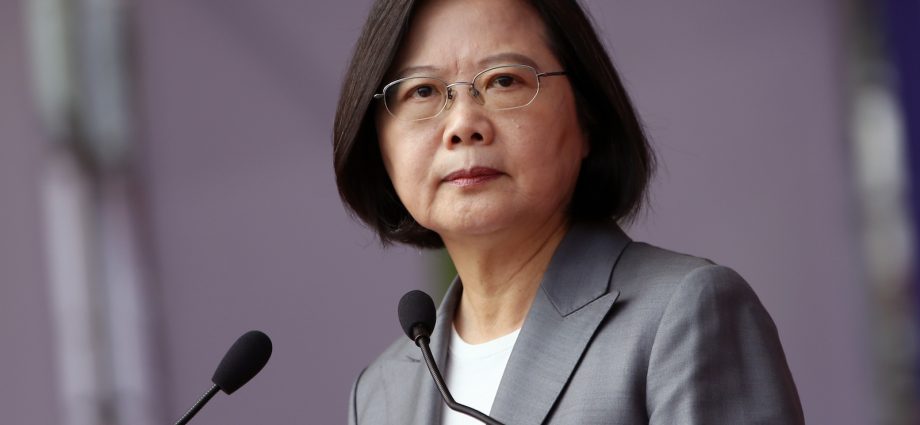Taiwan’s election campaign has been spiked with #MeToo intrigue after some 20 sexual harassment cases were alleged by victims and anonymous sources.
On June 6, Taiwanese President Tsai Ing-wen apologized for the Democratic Progressive Party (DPP)’s mishandling of a series of sexual harassment cases and promised to improve the government’s complaints channel to encourage #MeToo victims to report their cases.
Lai Ching-te, chairman of the DPP and potential candidate for the presidential elections next January, said the party will seriously handle every complaint and punish those who tried to cover up the cases. He admitted that the reported #MeToo cases over the last week had hurt the reputation of the DPP.
Kuomintang (KMT), the largest opposition party, has leveraged the controversy to attack the DPP. But it, too, has been accused of mishandling several sex-related cases in recent years.
Ko Wen-je, chairman of Taiwan People’s Party (TPP) and a presidential candidate, said he does not want sexual harassment cases to be used as political weapons at the upcoming elections.
China’s state media, including China Central TV, said Tuesday that at least 20 sexual harassment cases related to the DPP, KMT and TPP have been identified. Some news websites only mentioned the DPP’s cases and said Taiwanese people should vote down the party in the presidential elections next January.
At least ten #MeToo cases in the DPP were made public after Chen Chien-jou, a former DPP worker, said in a Facebook post on May 31 that she was sexually harassed by a film director several months ago.
Chen said her case was mishandled by Hsu Chia-tien, deputy secretary-general of the DPP and head of the party’s women’s affairs department, who asked for all the details but then left her to decide by herself whether she wanted to file a case.
Hsu resigned from her positions in the party on June 1 with her resignation accepted by Lai. Hsu has not made any comments as the DPP is investigating the case. Many other sexual harassment cases were then reported by Taiwanese media.
Among them, Tsai Wan-fen, then director of DPP women’s affairs department, was accused of receiving a case without bringing it to a higher level in the party, according to an anonymous source. Tsai said Wednesday that the case was closed without an investigation as the victim did not want to expose it.

President Tsai said in a Facebook post that she has held several meetings with Premier Chen Chien-jen and decided to reform the government’s complaint system in three ways:
- Follow the interactional practice and introduce a set of guidelines about gender equality to workplaces and schools;
- Set up a more robust, effective and credible complaint system to allow victims to report their cases without fear; and
- Amend relevant laws and push forward the promotion of gender equality.
“Recent events are not about politics or elections, but they remind us that apart from apologizing, we must work together to shape a safer and friendlier society,” Tsai says.
“Victims often do not come forward to accuse the perpetrators due to various concerns, and they have to suffer more during the investigation process,” she added. “Our society as a whole must re-educate ourselves. Victims of sexual harassment are not the wrongdoers. They are the people we want to protect, not the people to be treated with prejudice.”
KMT spokesman Yang Chih-yu on June 2 criticized the DPP for promoting gender equality while failing to correct its own failings. Yang said Tsai should be responsible for many cases, which happened at the time when she was DPP chairperson.
But then, Taiwanese journalist Dong Cheng-Yu wrote in a Facebook post that she had been kissed on her head by a KMT county chief without her consent during a meal with journalists and politicians in 2014. She said she had immediately scolded the county chief but did not tell the public until now.
Hou You-yi, a KMT presidential candidate, said the party should investigate the case. He said the party will not tolerate any sexual harassment offenses.
In the past few days, more cases involving political parties have been reported.
KMT lawmaker Hsu Chiao-hsin said on Monday that a DPP member surnamed Luo was accused of sending pictures of himself naked to dozens of male colleagues in 2019 but he is still allowed to work for the Tainan city government. Hsu said the person was a KMT lawmaker’s assistant before 2020.
An index that reflects netizens’ impressions of the DPP had risen from 0.3 in April to 0.53 in mid-May but it dropped to 0.21 after a sexual harassment case was reported on May 31, according to a survey conducted by the Taiwan Public Opinion Research Center.
However, a survey conducted by CNEWS, a Taiwanese news media, on May 31 and June 1 showed that President Lai was still leading in support with 35.5%, followed by Hou (32.1%) and Ko (24.4%).
Alex Tsai, a former member of the Legislative Yuan, said Hou is in an unfavorable situation as he fell behind Ko in Yunlin, Chiayi and Tainan counties. Tsai said Hou should use the DPP scandals to gain more votes from women, he said.
Read: Taiwan pushes FTA after closing US trade deal
Follow Jeff Pao on Twitter at @jeffpao3

